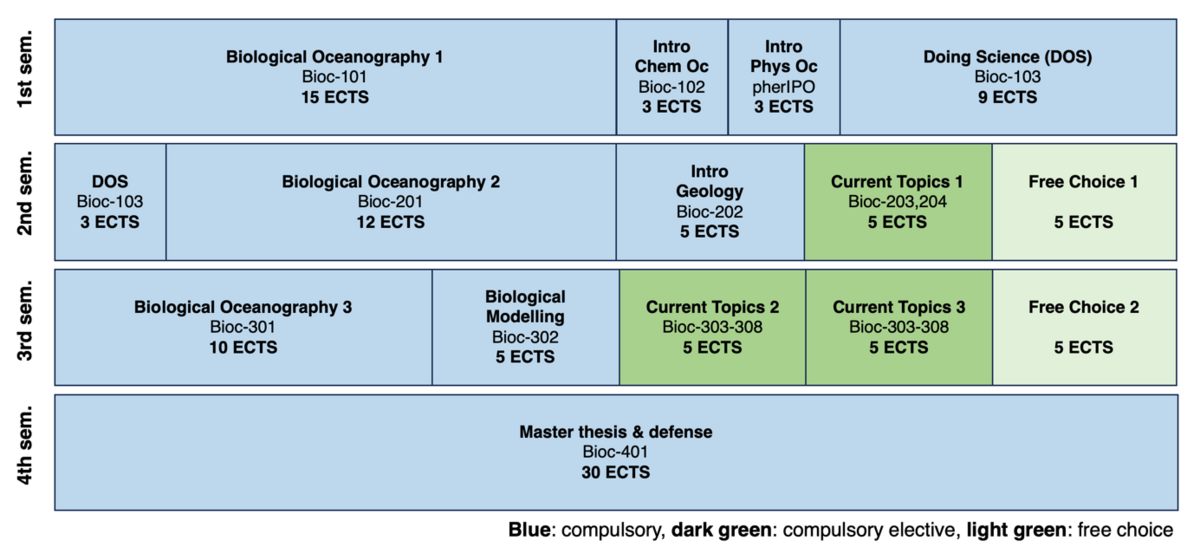Next application period: March 1 to April 15, 2025!
More information at "how to aply"

Schematic representation of the M.Sc. program ‘Biological Oceanography’ through the four semesters. Blue = mandatory courses, green = compulsory elective, light green = elective.
The unique 4-semester Master of Science (M.Sc.) program ‘Biological Oceanography’ provides knowledge and skills in a number of disciplines that address the global ocean as a complex system. The curriculum is focused on biological oceanography, but provides knowledge in chemistry, geology and physics of the ocean. This is essential, as only such an interdisciplinary system approach can help us understand vital ocean processes such as food web dynamics, ecosystem health and the role of the ocean in carbon cycling and climate change.
The strenths of our program are
'Discipline based education research' (DBER, Wieman 2019, Daedalus, DOI:10.1162/daed_a_01760) has convincingly demonstrated that the simulation of the entire scientific process within classes - including feedback-loops involving experimental failures and improvement of strategies - are fundamental for modern science teaching. We thus have recently increased the fraction of modules that follow DBER principles to improve learning outcomes of our students so that they can be successful in diverse job markets ranging from academia to environmental agencies, NGOs and industry. Exam types range from (a low fraction of) classical written exams to oral presentations, poster presentations and research proposals, reflecting the diverse demands of modern scientific jobs in marine fields and beyond.
The schedule allows students to also work as a paid student helpers (most students work ca. 5-10 hours a week) or to engage as a volunteer.
The first semester covers the fundamentals for the systemic analysis of the marine environment. All first semester modules are compulsory. The central modules Bioc-101 (Biological Oceanography 1, 10 weeks) and Bioc-103 (Doing Science, 4 weeks) are organized as block courses Monday, Tuesday, Thursday and Friday and encompass practical and theoretical work in the various subdisciplines, as well as introductions to working with R and Python, statistics, experimental design and the scientific process in general.
One week early in the semester is devoted to multiple, day cruises using the research vessel ALKOR, so that students learn to use typical instruments and sampling techniques to study pelagic and benthic ecosystems.
Weekly recurring modules in Chemical and Physical Oceanography (Bioc-102, pherIPO) and Doing Science (Bioc-103) fill Wednesday's schedule. The module Doing Science continues throughout the semester break. Here, students learn to design, plan (semester) and write (semester break) research proposals in small groups that they then present at the start of the second semester.
Building on the first semester's knowledge and skills, students begin to form their individual focus within the curriculum through compulsory and elective modules. As in the first semester, courses are blocked to allow for a maximum flexibility to run diverse experimental and analytical approaches.
The first week of the semester is devoted to presentation and discussion of research proposals prepared for the Doing Science module (Bioc-103). The following two weeks introduce students to essential practical techniques and theory in Marine Geology and benthic ocean observation (Bioc-202). This is followed by the large Biological Oceanography 2 module (Bioc-201, 10 weeks). Here, students can select practical projects in biogeochemistry and ecology & evolution (3 weeks each) that they run in small groups (2-4 students). These experiments allow for specialization and bring students in contact with the ‘real’ research of group leaders, Postdocs and doctoral candidates.
These projects are followed by blocks with a strong computational foundation (2 weeks each), addressing the need to further develop computing skills in advanced statistics, bioinformatics and large oceanographic data set handling to cope with ever increasing data amounts in the marine sciences.
Current topic modules (5 ECTS) in either ecology & evolution or biogeochemistry introduce students to in-depth concepts in the respective fields and involve seminar discussion and presentation of scientific papers. The semester is completed with 5 ECTS of free choice modules that can either be courses offered within our program in the summer (block courses in Kiel, Büsum and abroad), or courses offered by other curricula at CAU Kiel or other universities – depending on the interests of the student in question.
This semester is devoted to further specialization, intense literature discussion seminars, as well as an introduction into biological modelling.
First contacts to the research group where the students plan to do their master's thesis lead to the design of a research proposal for the master’s thesis within the module Bioc-301. This module also includes participation in scientific seminars and an internship or ship cruise element.
The weekly recurring Biological Modeling module (Bioc-302) builds on the computing experience in R and Python obtained in the first two semesters to enable students to understand how individual-based and biogeochemical ocean models are constructed and what their strengths and limitations are. Two compulsory-elective Current Topics modules (typically, 4 choices) enable students to specialize in the various sub-disciplines and to practice literature reading, discussion and presentation skills. The semester is once again completed by 5 ECTS of free choice modules to allow for an individualization of the study program.
In the fourth semester students apply the knowledge they have gathered in the first three semesters toward work on the master's thesis, typically associated with ongoing research projects in the various research groups at GEOMAR. The module Bioc-401 consists of the written master thesis and an oral defense.
Our graduates are very successful in a wide range of fields ranging from academia to industry, NGOs to governmental agencies. Graduates work in the fields of

